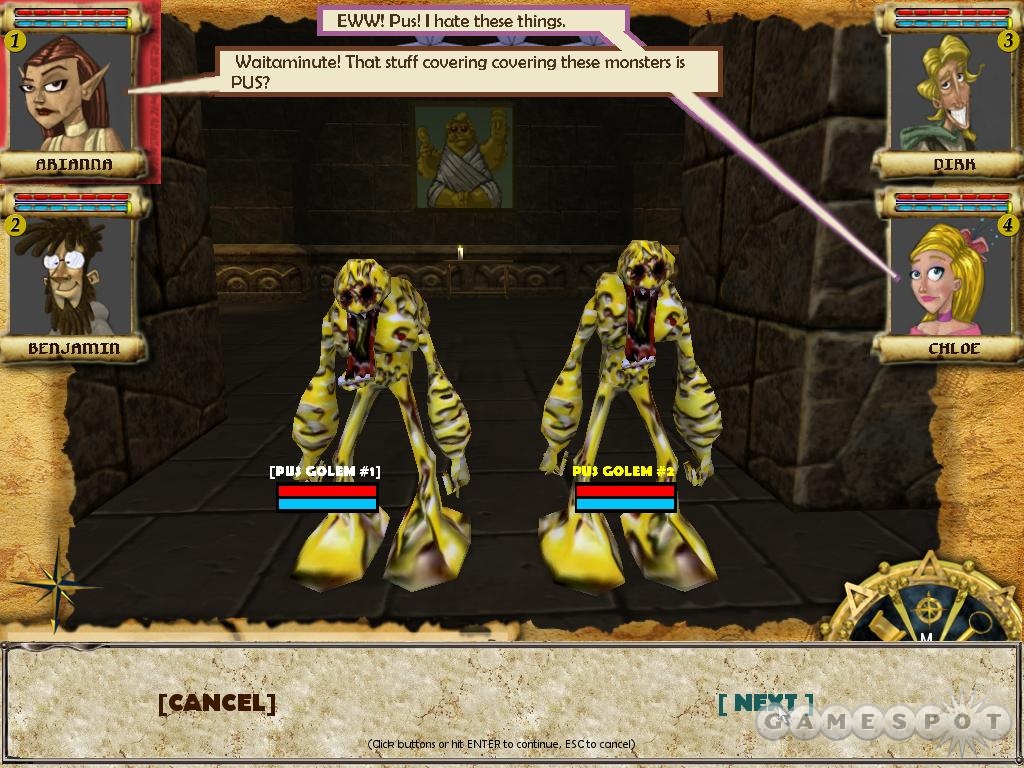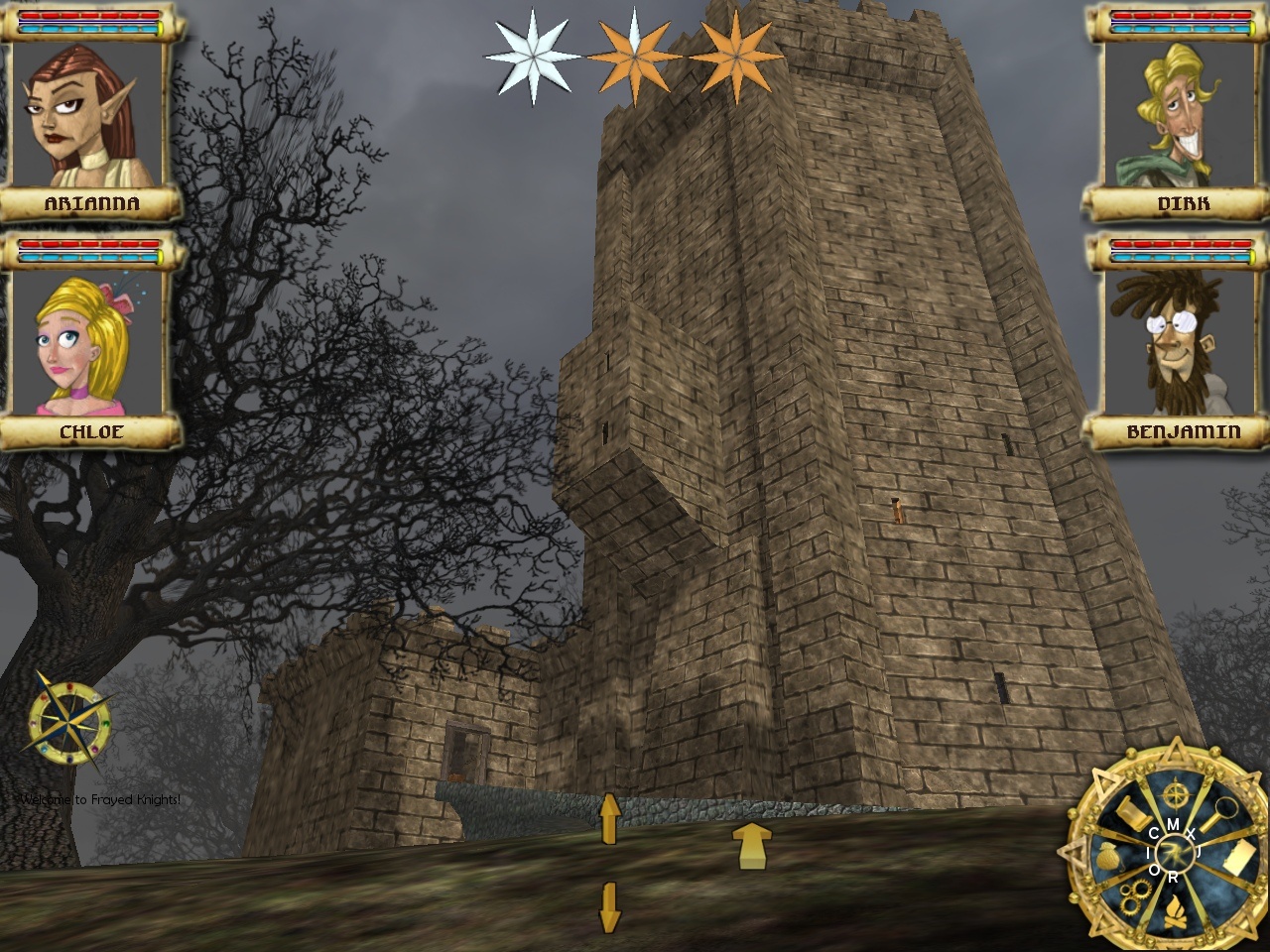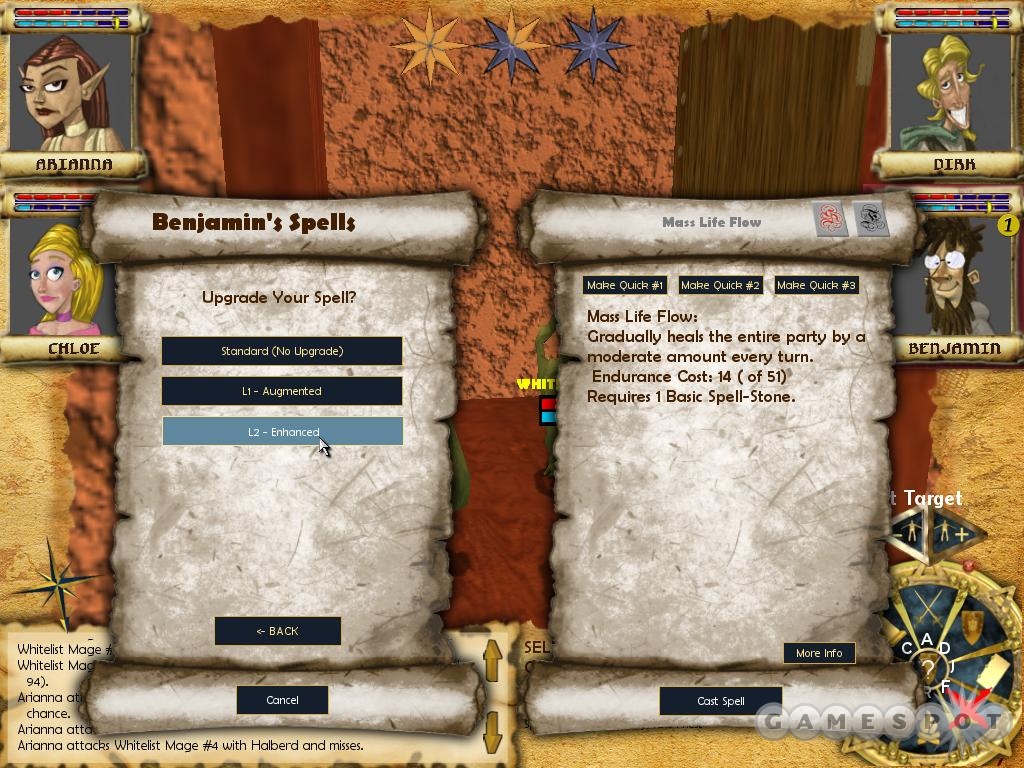Some look back on such classic games as Dungeon Master, Eye of the Beholder, and Might and Magic: World of Xeen and lament, "They don't make games like this anymore." That's not true. The first-person party-driven dungeon crawler may no longer dominate the role-playing-game market, but small developers are still making them. Frayed Knights: The Skull of S'makh-Daon is one such game, combining old-school visuals with a rather silly sense of humor and a harsh level of difficulty right out of the early 1990s.

You play as a party of young adventurers out to earn membership in the Adventurer's Guild. These adventurers are a pregenerated lot, but you can customize them as you advance. You can give sorcery or dark magic to your warrior or make her a walking Cuisinart by focusing on sword or axe abilities. The characters had to be pregenerated because of the game's dialogue, which is one of the highlights of Frayed Knights, though some players might miss the ability to create a character from scratch.
The way into the Adventurer's Guild sits in a temple dedicated to the god of pus and pimples (that's the silly humor at work). The group botches the caper before it even starts (thanks to a sexual peccadillo, no less), threatening its spot in the Guild. But you receive a second chance at earning the spot as you find a powerful artifact and discover an even deadlier force. You explore a world full of silly names and lethal foes, such as The Tower of (Almost) Certain Death, Goblinville, and the papier-mache dragon. The story isn't all that interesting, but what makes Frayed Knights appealing is the humor you encounter as you make your way through your quest.
That humor isn't highbrow (unless you consider pus golems highbrow), but it's one of the highlights. The four party members routinely talk with and snipe at one another, throwing out some funny lines as you explore the dungeons. Some item and spell names, such as the quarterstaff of nad-whacking or deep fat fry, may make you snicker and smile. One of the game's final dungeons also has a fantastic riff on why adventurers frequently encounter lit torches in dungeons, even if those halls haven't been explored for decades (or centuries). The light tone is a draw, especially considering how seriously many RPGs take themselves these days.
Frayed Knights is a throwback to old first-person dungeon crawlers; the visuals are blocky and not at all appealing, though some fit well with the game's humor. The user interface for accessing spells is clunky; you can assign three to hotkeys in the spellcasting menu, but as you gain more spells (and feats that allow you to augment your magic), you end up spending a lot of time clicking in menus when you want to cast "deep fat fry" on an uppity goblin. The randomness of the combat can also be a chore. Most of your actions are based on percentile die rolls, and this brings an element of randomness to the combat. It sometimes seems like the enemies connect on their attacks more often than you do--especially early in the game, when you don't have as many bonuses and buffs at your disposal. It's especially frustrating when you cast an area-of-effect spell, and the enemies completely resist damage. In most RPGs, such spells at least do half damage if enemies make their saving throws.

The most frustrating aspect of Frayed Knights is its endurance system. Endurance governs all of your actions in combat: attacks, defending, and casting spells. And it doesn’t take more than one or two encounters before you run out of endurance. You can rest while exploring, but as you spend more time resting in anything besides a proper bed, your maximum endurance decreases. You can also "take a breather" during combat, skipping a turn and gaining a little endurance. Much of the game becomes an exercise in managing endurance, especially for your spellcasters, as magic requires more endurance than melee attacks. This becomes quite tiresome, especially as higher-level spells require more endurance. You might find yourself "taking a breather" several times during combat, casting a sleep spell and regaining endurance while a foe snores. This artificially extends combat, taking time away from actually playing the game. And the longer you go without proper bed rest, the less endurance you're able to regain.
The approach to magic in Frayed Knights is frustrating as well. Some spells (especially area-of-effect damage spells and party-wide buffs) require the use of spellstones for you to cast them. The merchant in town has a despairingly small number of these, and you don't find many more in dungeons. By the time you do find a merchant who sells them, it's about midway through the game. By limiting spellstone supply, the game locks you out of using some spells, and you don't really feel like you can freely use such magic until you reach the final dungeons in the game.
Frayed Knights does do a couple of things, besides humor, that are interesting. It has a minigame for disarming traps and opening locks. Dirk, your thief, can use 10-foot poles, acid, lock picks, and other items to solve traps. The minigame isn't very involved; you pick the items you want to use and apply them to the lock or trap. But it's more interesting than most lock-picking systems, if not as fun or challenging as the system in Two Worlds II. When picking a lock, you use a combination of items rather than just a lock pick. Some of these objects work better than others, and the fun comes from experimenting with them and seeing what works and what doesn't.

The drama star system in Frayed Knights is a great idea. A set of three stars sits in the top-middle area of the screen, and portions of the stars fill as you overcome difficult situations and defeat foes. As the stars fill up, you gain access to special one-use powers that heal you, replenish your endurance, or bring you back from incapacitation (you don't die in Frayed Knights). But the stars reset to empty every time you reload the game. The idea here is that you won't quit and reload when an encounter becomes difficult (or almost deadly) because you risk losing the progress you've made in the star meter. It's an interesting approach that encourages players to push through an encounter instead of quitting and giving it another go. Say Benjamin the priest is knocked out; if your star meter is full enough, you can get him back upright--and maybe even rested--and ready to get back into the fight. But if Benjamin is getting low on health and you reload an earlier save, he might still take a lot of damage, and you'd have squandered the chance to use a powerful restorative move.
Frayed Knights isn't as good as classic first-person dungeon crawlers, such as Dungeon Master, but it provides a great amount of challenge. And for a few hours, it shows that you don't need state-of-the-art visuals or multiplayer to make an interesting and fun RPG. But don't into the game expecting a smooth, easy experience: Frayed Knights' hard-to-use menus and the constant management of endurance can make the game an occasional chore.